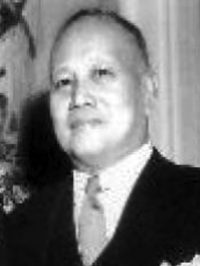Another incident happened during lunchtime. A colonist seemed to have lost his way and he was passing very near the messhall where we eat. A very blonde American guard yelled at him telling him to get out. The guard thought that Paredes was talking to the colonist and yelled at him. Paredes was enraged, saying that he was not talking to him. The guard told Paredes to stop talking. Paredes approached the guard as if to strike him. There was great excitement. The tough guys with us surrounded the guard to help Paredes in case of necessity. Fortunately the guard calmed down. He explained that he was talking to the colonist and not to Mr. Paredes. He left and reported the incident to the Lieutenant. What would have happened if a fight had ensued? The guard was armed with a carbine and submachinegun. Behind us was another armed guard and we were near the Army barracks. In case of a riot, we undoubtedly would have been mowed down.
This guard is the roughest and the most anti-Filipino among the guards. He treats us very roughly. He was heard to have called the Filipinos “monkeys”, and this is the reason why we call him “white monkey”. With this antecedent, everybody was aching to have a crack at him.
The Lieutenant immediately came to the barracks to investigate. F.C. de la Rama intervened. He told the Lieutenant that one morning the guard went around the barracks waking up the people and calling them monkeys. The Lieutenant’s attitude was hostile towards De la Rama; he did not seem to be inclined to believe him. Paredes gave his version of the incident that just happened and added that the Lieutenant better call the colonist to find out the truth. The Lieutenant answered that he would not investigate as he is convinced that Paredes was telling the truth.
The Lieutenant must have reprimanded the guard as the next day he approached Paredes to offer his apology. He kept repeating that he had never called the Filipinos monkeys.
In connection with the meetings in the house of Speaker Yulo at the beginning of the Japanese occupation to the list of those who attended must be added the name of ex-Senator, the late Jose Ozamis.
